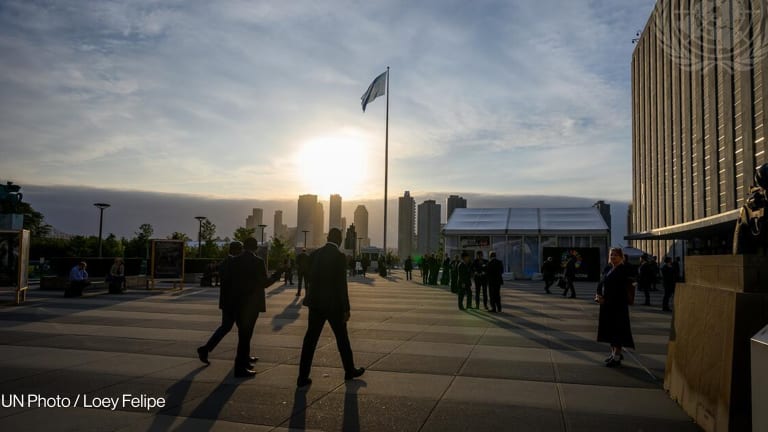
UNITED NATIONS — The Trump administration is pushing for language in two separate U.N. resolutions on women and children that would only condemn violence in certain “unlawful,” circumstances rather than a blanket statement of “all forms” of violence.
The move is isolating the United States in the U.N. General Assembly and has prompted stern criticism from human rights and health organizations, including the International Women’s Health Coalition.
Russia is the only other country to previously adopt a similar same stance, lobbying to condemn “unlawful” violence — rather than all forms of violence — against women and children. Russia decriminalized some forms of domestic violence in January this year, making “moderate” violence in the home only an administrative offense.
The U.S. has never before taken such a controversial position on these resolutions that the General Assembly approves annually, said Shannon Kowalski, the director of advocacy and policy at the New York-based International Women’s Health Coalition, a policy group that has been closely following the ongoing negotiations.
“It’s such an extreme position, and it is a position that just shows how out of line the Trump administration is with the rest of the world. The fact they would take a position that would actively hurt women, particularly in countries where laws have not yet caught up with public sentiment — it is just absolutely astounding to me,” Kowalski said. “It is unconscionable. We would do everything to ensure the U.S. was not able to take this forward — now, or in the future.”
The United States’ surprise campaign to alter the first resolution, the “Promotion and protection of the rights of children,” has been unsuccessful. While the U.S. pushed to condemn all “unlawful” forms of violence against all children, in all settings, the resolution, as it now stands, condemns “all forms of violence,” according to the latest text version Devex reviewed. The U.S. is expected to issue an explanation of its position in the G.A.’s third committee, where the resolution has been tabled. Portugal is the primary sponsor of the children’s rights resolution.
An African group of countries has also raised similar concerns over “unlawful” violence in a different resolution now passing through the G.A. on the rights of women and girls with disabilities.
In negotiations in early November, the U.S. delegates said that some forms of violence against children are legal in the United States, and that it was a question of safeguarding states’ rights, as Foreign Policy reported.
Similarly, the U.S. has sought to change a section of the text of the “Women in Development” resolution, now in the G.A.’s second committee, to read, “Stresses the need to take action to prevent and eliminate unlawful violence and discrimination against women and girls,” replacing the “all forms of violence” edit put in by the European Union, G-77, Norway, Mexico, Canada, Australia, and New Zealand.
This resolution on women in development is still being negotiated, according to Kowalski. The U.S. is said to have most recently backed off on the “unlawful” forms of violence against women and girls language addition in this resolution, but has asked for the deletion of language on reproductive rights.
More than 140 countries have passed laws on domestic violence and sexual harassment, but 37 countries exempt rape perpetrators from prosecution if they are married to, or marry, the victim, according to UN Women.
And while only 60 countries have legislation that prohibits corporal punishment at home, 732 million school-age children are also not legally protected from corporal punishment at school.
The U.S. is the only country to not have adopted the 1990 Convention of the Rights of the Child, and is also one of the few, including Iran, that has not adopted CEDAW, considered the most comprehensive international agreement on women’s human rights.
These positions could also be a sign that the U.S. is likely to take extreme stances on motherhood and sexual and reproductive health during the next annual Commission on the Status of Women meeting at the U.N. in early 2018, Kowalski suggests.
“That would be a good one to watch: the U.S. taking more control over the message and the positions coming out of these spaces,” she said.
Read more Devex coverage on U.S. aid.








